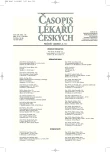Conservative Treatment of the Traumatic Neurogenic Bladder Dysfunction
Konzervativní léčba traumatických neurogenních dysfunkcí močových cest
Cílem konzervativní léčby neurogenních dysfunkcí je ochrana horních močových cest a zlepšení kontinence. V rozhodování je třeba vzít v úvahu multifaktoriální přístup k těmto pacientům a léčbu individualizovat dle výsledků v diagnostickém procesu, vedlejších účinků, spolupráce pacienta a jeho rodiny. Léčba zlepšující jímací funkci močového měchýře je zaměřena na inhibici kontraktility, snížení senzitivity a nárůst kapacity, nebo na zesílení výtokového odporu, léčba zlepšující evakuační funkci je kromě čisté intermitentní (auto)katetrizace zaměřena na nárůst kontraktility detruzoru a/nebo snížení výtokové rezistence. Častá je kombinace různých přístupů.
Klíčová slova:
neurogenní dysfunkce močových cest, konzervativní léčba.
Authors:
K. Novák
Authors‘ workplace:
Urologická klinika 1. LF UK a VFN, Praha
Published in:
Čas. Lék. čes. 2007; 146: 813-816
Category:
Original Article
Overview
The goal of the conservative treatment of neurogenic bladder dysfunction is preservation of upper urinary tract and improving continence. The multifactorial approach is needed in the decision and the treatment must be individualized according to the results and side effects, patients and his family compliace. The therapy facilitating urine storage is focused on inhibiting bladder contractility, decreasing sensory input and increasing bladder capacity or increasing outlet resistance. The therapy facilitating voiding is focused except clean intermittent (auto)catheterization on increasing bladder contractility and decreasing outlet resistance. The combination of different approaches is frequent.
Key words:
neurogenic dysfunction of urinary tract, conservative treatment.
Labels
Addictology Allergology and clinical immunology Angiology Audiology Clinical biochemistry Dermatology & STDs Paediatric gastroenterology Paediatric surgery Paediatric cardiology Paediatric neurology Paediatric ENT Paediatric psychiatry Paediatric rheumatology Diabetology Pharmacy Vascular surgery Pain management Dental HygienistArticle was published in
Journal of Czech Physicians

- Advances in the Treatment of Myasthenia Gravis on the Horizon
- Possibilities of Using Metamizole in the Treatment of Acute Primary Headaches
- Metamizole vs. Tramadol in Postoperative Analgesia
- Spasmolytic Effect of Metamizole
- Metamizole at a Glance and in Practice – Effective Non-Opioid Analgesic for All Ages
-
All articles in this issue
- New Aspects in Prostate Cancer Therapy
- Radical Cystectomy in the Treatment for Bladder Carcinoma: Results of 125 Operated Patients
- Cystectomy in the Treatment of Bladder Cancer
- Laparoscopic Radical Nephrectomy – The Cohort of 150 Patients
- Carcinoma of the Penis
- Controversial Opinions in the Prostate Cancer Treatment
- Comparison of the Efficacy of ESWL and Ureteroscopy in the Treatment of Lower Ureteric Stone
- Long-term Results of Uretroplastic Operations Using Buccal Mucosa in Different Modifications
- Detection of Prostate Cancer by Ultrasonographically-guided Transrectal Prostate Biopsies at the Department of Urology of the First Faculty of Medicine, Charles University and General Teaching Hospital in Prague, Analysis of 1464 Cases
- Evaluation of the Tumor Extension Before Planned Radical Prostatectomy: A Prospective Study
- Painful Bladder Syndrome in Interstitial cystitis: Relation Between Symptoms, Endoscopy and Biopsia Results and the Treatment Effects
- Progress of Laparoscopic Surgery in Adults at the Department of Urology of the First Faculty of Medicine and General Teaching Hospital
- Analyse of Results of Percutaneous Nephrolithotomies
- Conservative Treatment of the Traumatic Neurogenic Bladder Dysfunction
- Endoscopic and Conservative Treatment of Vesicoureteric Reflux
- Microsurgical Subinguinal Varicocelectomy in Children and Adolescents
- Journal of Czech Physicians
- Journal archive
- Current issue
- About the journal
Most read in this issue
- Painful Bladder Syndrome in Interstitial cystitis: Relation Between Symptoms, Endoscopy and Biopsia Results and the Treatment Effects
- Microsurgical Subinguinal Varicocelectomy in Children and Adolescents
- Long-term Results of Uretroplastic Operations Using Buccal Mucosa in Different Modifications
- Radical Cystectomy in the Treatment for Bladder Carcinoma: Results of 125 Operated Patients
